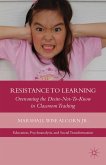Internationalizing the Psychology Curriculum in the United States responds to this challenge by setting out clear guidelines for educating and training new generations of culturally attuned practitioners and scholars. Addressing graduate course needs in a wide range of specialties, contributors explore the impact of sociopolitical and other local forces on the individual, and how this in turn can be used in more culturally sensitive and authentic practice. The book includes an overview of the evolution of psychology from ethnocentric bias to international worldview, and makes content-rich recommendations for modifying course design and objectives in these core areas:
- History of psychology
- Professional and research ethics
- Developmental psychology
- Social psychology
- Personality
- Gender psychology
- Clinical psychology
- Counseling psychology
- School psychology
- Testing and assessment.
- Industrial/organizational psychology
- Health psychology
- Peace psychology
Internationalizing the Psychology Curriculum in the United States makes an up-to-date reference for cross-cultural psychologists and an invaluable sourcebook for professors teaching upper- and graduate-level psychology courses.
Dieser Download kann aus rechtlichen Gründen nur mit Rechnungsadresse in A, B, BG, CY, CZ, D, DK, EW, E, FIN, F, GR, HR, H, IRL, I, LT, L, LR, M, NL, PL, P, R, S, SLO, SK ausgeliefert werden.
"The book Internationalizing the Psychology Curriculum in the United States puts psychology into an accurate global perspective. It will appeal to psychologists who want to expand their views of traditional psychology to be more inclusive, contextual, and global. ... It is an easy-to-use quick reference, as well as an in-depth examination. Most of the chapters are straightforward and easy to read, even while covering complex topics. The book can serve as an important guide for faculty who wish to update their courses." (Gloria Grenwald, PsycCRITIQUES, Vol. 57 (32), August, 2012)









